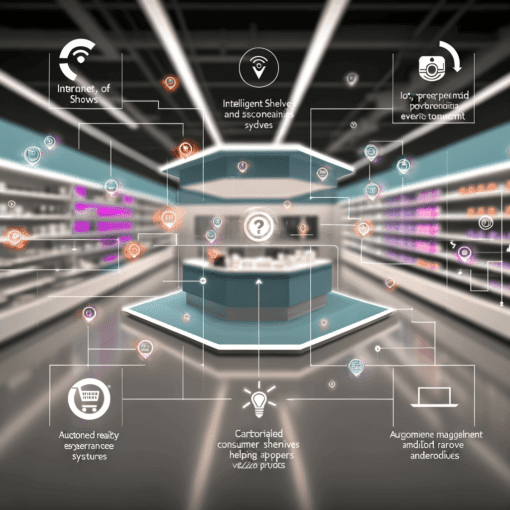Introduction
In the rapidly evolving technological landscape, the Internet of Things (IoT) has emerged as a pivotal force, reshaping various industries and spearheading innovations that once seemed futuristic. Among the most compelling applications of IoT is in the realm of personalized shopping experiences. The fusion of IoT and retail not only redefines customer engagement but also introduces unprecedented efficiency and personalization. This blog delves into the burgeoning field of IoT-powered personalized shopping experiences, examining its potential for innovation, potential market disruption, and the challenges and opportunities it presents, particularly in the startup ecosystem.
The Innovation Potential of IoT in Shopping
IoT technology integrates seamlessly with the retail environment to create personalized experiences that cater to the evolving demands of tech-savvy consumers. The potential for innovation in this space is vast. As devices become increasingly interconnected, the ability to gather and analyze data in real-time becomes more sophisticated. IoT devices such as smart shelves, beacons, and wearable technology provide retailers with insights into consumer preferences and behavior, enabling highly personalized shopping experiences. For example, Amazon Go stores use IoT technology to track customers and automate the checkout process, creating a seamless and convenient shopping experience.
Moreover, IoT-powered augmented reality (AR) applications can transform the in-store experience, allowing customers to visualize products in their own space before making a purchase. This blend of physical and digital shopping realms exemplifies the incredible innovative potential of IoT, turning retail spaces into interactive, immersive environments.
Market Disruption: The Impact of IoT on Retail
The introduction of IoT into retail has disrupted traditional business models, equipping startups with the tools to challenge established players. IoT’s capability to enhance supply chain efficiency, optimize inventory management, and personalize marketing strategies offers startups a competitive advantage. For instance, IoT sensors can provide real-time data on stock levels, automatically triggering restocking processes and reducing wastage, a vital component of just-in-time inventory management.
Startups leveraging IoT solutions can offer differentiated services and products, thus capturing niche markets or carving out new ones. This capacity for disruption is particularly significant in an era where customer expectations are continually rising in the wake of digital-first service standards set by tech giants.
Key Challenges for Startups
Despite its potential, IoT implementation in retail is not without challenges. Startups face hurdles such as high initial setup costs, data security concerns, and the need for significant technical expertise. The integration of IoT systems requires upfront investment in hardware, software, and training, which can be a significant barrier for early-stage startups with limited resources.
Moreover, data privacy and security have become critical concerns as IoT devices collect vast amounts of consumer data. Startups must prioritize data protection to maintain customer trust and comply with regulatory requirements such as GDPR or CCPA. This requires sophisticated cybersecurity measures and robust data management practices.
Unique Opportunities for Startups
While challenges exist, IoT also presents unique opportunities for startups to innovate and differentiate. By focusing on niche markets or specific consumer pain points, startups can leverage IoT to offer tailored solutions that cater to specific consumer segments. This specialization can foster customer loyalty and facilitate standout positioning in an often-saturated marketplace.
Furthermore, IoT’s data-driven nature provides invaluable analytical insights that can be harnessed to refine product offerings and enhance customer experience continually. Startups that effectively utilize IoT data can anticipate trends, improve product recommendations, and deliver personalized marketing, driving customer satisfaction and retention.
Strategies for Success
-
Fundraising and Investment: IoT startups in the retail sector require substantial capital to cover R&D, infrastructure, and market expansion costs. It is crucial to articulate a clear value proposition and demonstrate IoT’s tangible benefits in terms of customer acquisition and retention to attract investors. Crowdfunding, venture capital, and strategic partnerships with established companies can be valuable funding avenues.
-
Achieving Product-Market Fit: Developing a product that addresses a clearly defined market need is crucial. Startups must leverage IoT’s capability for personalization to meet specific consumer demands. This requires thorough market research and iteration on product features based on user feedback and data analytics.
-
Scaling Operations: As demand for IoT-enabled solutions grows, scaling becomes a priority. Startups must invest in scalable IoT architecture and capable teams while maintaining operational efficiency. Strategic partnerships with other tech companies can facilitate scaling by providing access to new markets or technological expertise.
- Customer Acquisition and Retention: A data-driven approach to marketing powered by IoT insights can enhance customer acquisition efforts. Personalization strategies such as personalized promotions or customized notifications can boost engagement and conversion rates. Furthermore, maintaining a focus on customer service and continuous improvement via data feedback loops is crucial for retention.
Case Studies of Success
Notable startups have successfully harnessed IoT to revolutionize personalized shopping. For instance, Zest Labs has utilized IoT-enabled solutions to improve supply chain transparency, significantly reducing food waste and garnering a strong customer base. Another example is InContext Solutions, which employs VR and IoT to offer virtual store simulations, allowing retailers to optimize product placement and improve shopper engagement.
Role of Academic Research and Industry Reports
Academic research and comprehensive industry reports provide valuable insights into emerging trends and technological advancements in IoT. They serve as a resource for startups looking to identify innovation opportunities and refine their business models. Industry reports from entities like McKinsey, Deloitte, and Gartner can offer data-driven insights into market dynamics, customer preferences, and technology adoption rates, guiding strategic decision-making.
Conclusion
The convergence of IoT and retail heralds a new era of personalized shopping experiences, transforming consumer engagement and creating vast opportunities for startups. Despite the challenges inherent in IoT adoption, the opportunities for differentiation and market penetration are significant. By focusing on targeted innovation, leveraging IoT data, and employing strategic growth strategies, startups can effectively navigate the complexities of this transformative technological landscape, ultimately driving success in the IoT-powered personalized shopping domain.

